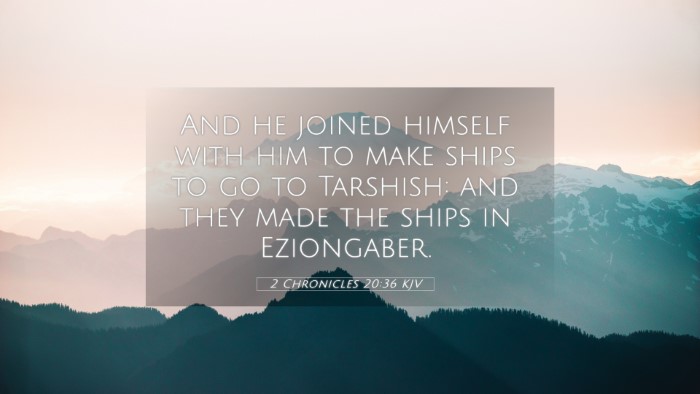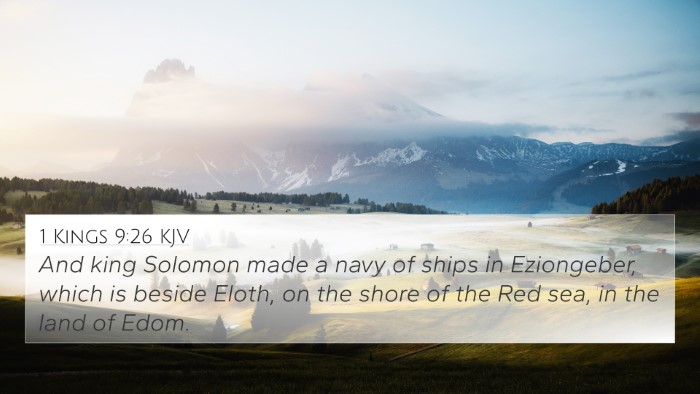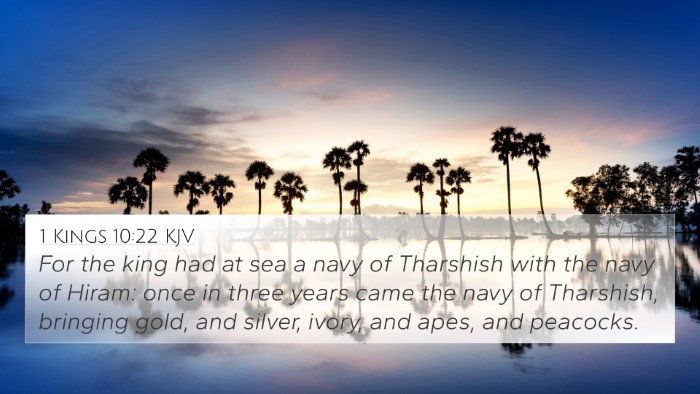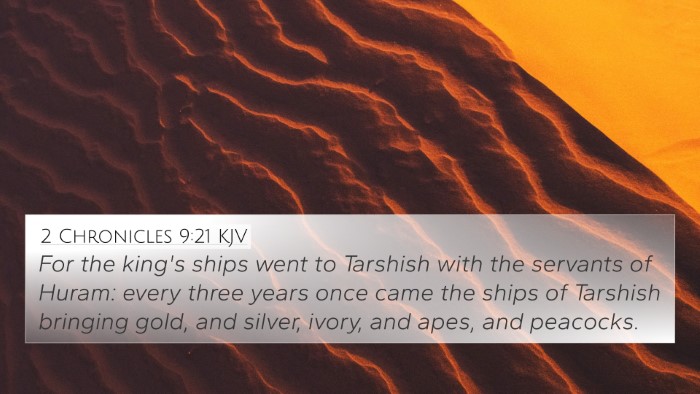Understanding 2 Chronicles 20:36
Verse: 2 Chronicles 20:36 – "And he joined himself with him to make ships to go to Tarshish: and they made the ships in Ezion-geber."
General Overview
The verse depicts a significant alliance made in the context of King Jehoshaphat of Judah, who formed a partnership with King Ahaziah of Israel to construct ships at Ezion-geber for trading expeditions to Tarshish. This act highlights both the ambitions and the political dynamics at play during Jehoshaphat's reign.
Commentary Insights
Matthew Henry's Commentary
Matthew Henry observes that Jehoshaphat's alliance with Ahaziah, despite previous warnings against mingling with the house of Ahab, reveals the temptation of worldly wisdom over divine guidance. The strife in the nation reflects how this partnership was ill-conceived, as Ahaziah was notably evil.
Albert Barnes' Notes on the Bible
Albert Barnes stresses the significance of the ships being built for trade rather than for military aid. He points out that this decision indicates a shift in strategy for Jehoshaphat, leaning towards commerce rather than conflict. However, this partnership eventually leads to disaster as the fleet fails, demonstrating God's disfavor on such alliances.
Adam Clarke's Commentary
Adam Clarke expounds on the geographical and historical context of Ezion-geber, indicating its strategic importance as a port for maritime trade. Clarke also highlights the divine consequences of Jehoshaphat's actions, noting that even seemingly beneficial alliances need to align with God's will.
Thematic Analysis
This verse encourages the reader to contemplate the implications of making alliances that may lack divine sanction. It serves as a reminder of the importance of seeking God's counsel in decisions, whether they involve leadership, commerce, or personal relationships.
Key Cross-References
- 1 Kings 22:49 - Jehoshaphat's involvement with ships and Ahaziah.
- 2 Chronicles 19:2 - The warning against alliances with the wicked.
- Psalm 1:1 - Blessed is the one who does not walk in step with the wicked.
- Proverbs 13:20 - Walk with the wise and become wise.
- Isaiah 30:1 - Woe to the rebellious children who take counsel, but not of Me.
- James 4:4 - Friendship with the world is enmity with God.
- Isaiah 43:8-9 - God’s call to His people and violence against alliances that lead away from Him.
Practical Applications
For those engaging in Bible cross-referencing, understanding this verse emphasizes the need to examine the characters and motivations behind our alliances, whether in ecclesiastical, personal, or social realms.
As believers, it is crucial to engage in comparative Bible verse analysis following 2 Chronicles 20:36, to better understand the connectivity of biblical themes and to discern God’s will clearly. Adhering to the tools for Bible cross-referencing can guide one through complex decisions, ensuring alignment with scriptural truths.
Conclusion
2 Chronicles 20:36 offers profound lessons about the nature of alliances and the consequences of forsaking divine guidance. By seeking the connections between this verse and others in scripture, one can cultivate a deeper understanding of God’s expectations and intentions, ultimately leading to more faithful living.





